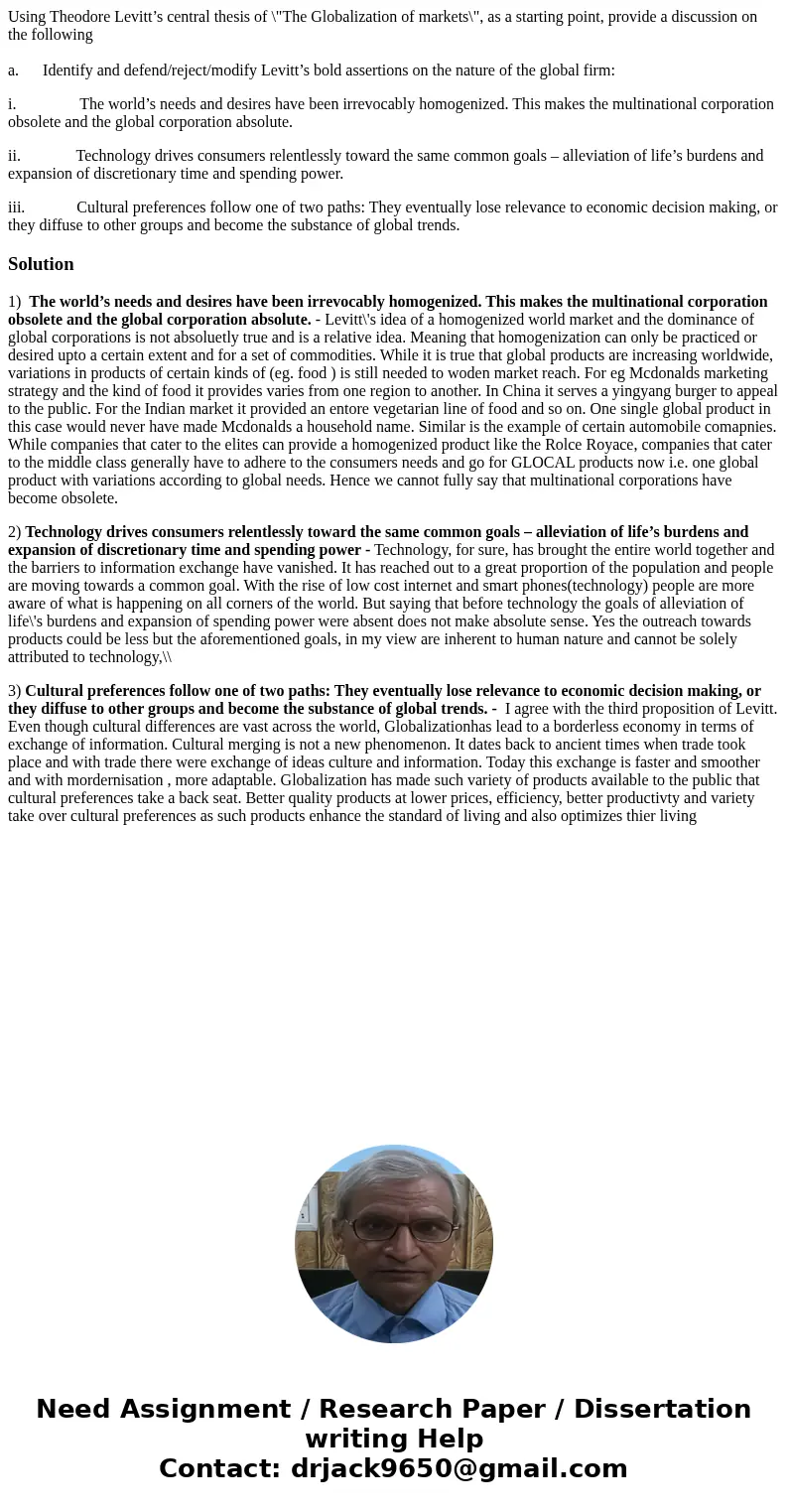Using Theodore Levitts central thesis of The Globalization o
Using Theodore Levitt’s central thesis of \"The Globalization of markets\", as a starting point, provide a discussion on the following
a. Identify and defend/reject/modify Levitt’s bold assertions on the nature of the global firm:
i. The world’s needs and desires have been irrevocably homogenized. This makes the multinational corporation obsolete and the global corporation absolute.
ii. Technology drives consumers relentlessly toward the same common goals – alleviation of life’s burdens and expansion of discretionary time and spending power.
iii. Cultural preferences follow one of two paths: They eventually lose relevance to economic decision making, or they diffuse to other groups and become the substance of global trends.
Solution
1) The world’s needs and desires have been irrevocably homogenized. This makes the multinational corporation obsolete and the global corporation absolute. - Levitt\'s idea of a homogenized world market and the dominance of global corporations is not absoluetly true and is a relative idea. Meaning that homogenization can only be practiced or desired upto a certain extent and for a set of commodities. While it is true that global products are increasing worldwide, variations in products of certain kinds of (eg. food ) is still needed to woden market reach. For eg Mcdonalds marketing strategy and the kind of food it provides varies from one region to another. In China it serves a yingyang burger to appeal to the public. For the Indian market it provided an entore vegetarian line of food and so on. One single global product in this case would never have made Mcdonalds a household name. Similar is the example of certain automobile comapnies. While companies that cater to the elites can provide a homogenized product like the Rolce Royace, companies that cater to the middle class generally have to adhere to the consumers needs and go for GLOCAL products now i.e. one global product with variations according to global needs. Hence we cannot fully say that multinational corporations have become obsolete.
2) Technology drives consumers relentlessly toward the same common goals – alleviation of life’s burdens and expansion of discretionary time and spending power - Technology, for sure, has brought the entire world together and the barriers to information exchange have vanished. It has reached out to a great proportion of the population and people are moving towards a common goal. With the rise of low cost internet and smart phones(technology) people are more aware of what is happening on all corners of the world. But saying that before technology the goals of alleviation of life\'s burdens and expansion of spending power were absent does not make absolute sense. Yes the outreach towards products could be less but the aforementioned goals, in my view are inherent to human nature and cannot be solely attributed to technology,\\
3) Cultural preferences follow one of two paths: They eventually lose relevance to economic decision making, or they diffuse to other groups and become the substance of global trends. - I agree with the third proposition of Levitt. Even though cultural differences are vast across the world, Globalizationhas lead to a borderless economy in terms of exchange of information. Cultural merging is not a new phenomenon. It dates back to ancient times when trade took place and with trade there were exchange of ideas culture and information. Today this exchange is faster and smoother and with mordernisation , more adaptable. Globalization has made such variety of products available to the public that cultural preferences take a back seat. Better quality products at lower prices, efficiency, better productivty and variety take over cultural preferences as such products enhance the standard of living and also optimizes thier living

 Homework Sourse
Homework Sourse